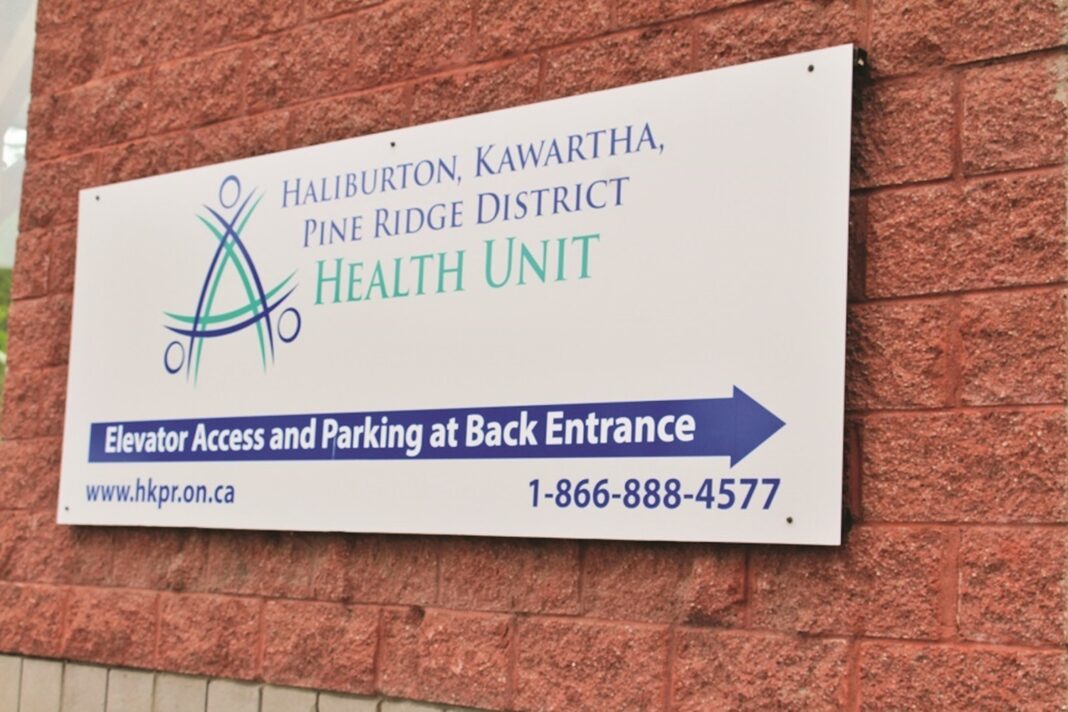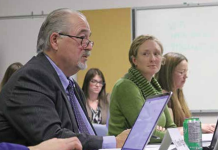The Haliburton, Kawartha, Pine Ridge district health unit (HKPR) is projecting to finish the year with a $188,467 budget shortfall, with medical officer of health Dr. Natalie Bocking admitting funding increases from the Ministry of Health, capped at one per cent for 2024, 2025 and 2026, aren’t enough to maintain current service levels.
Addressing the HKPR board Nov. 21, Bocking said the health unit was prepared for a deficit and planned to use cash reserves to cover it.
The organization approved $500,000 be taken from a cash surplus reserve fund, made up from monies received from municipal partners within the district, to balance the budget in 2024. Bocking said the in-year job vacancies, which HKPR didn’t fill, and other operational efficiencies meant less than half that amount was used.
Looking ahead to 2025, Bocking said the health unit is projected to use $297,089 to balance next year’s budget. While HKPR has an agreement to merge with Peterborough Public Health (PPH) in 2025, it has yet to receive provincial approval, meaning the two health units had to submit separate budgets for the coming year.
Costs are slated at just under $22.4 million, split into three streams – provincial and municipal cost sharing, which covers all basic health unit expenses; one-time money for select provincially-funded programs; and money coming in from other provincial grants.
HKPR is expecting to receive $13.08 million from the province next year, a one per cent increase, $2.89 million from Northumberland County, $2.56 million from City of Kawartha Lakes, and $666,396 from Haliburton County. Municipal contributions are up five per cent, Bocking said.
The health unit will receive another $1,185,500 to support the Ontario Seniors Dental Program and $247,000 from the Infection and Prevention Control (IPAC) hub.
Staff salary and benefits account for about 70 per cent of costs, with Bocking saying two new collective agreements resulted in a 3.65 per cent increase in wages from last year.
To cut costs last year, HKPR left four previously staffed positions vacant after existing staff left or retired. Those positions remain unfilled, and Bocking noted there are two additional vacancies this year.
“Gapping has an impact on services and programs… the budget we’re presenting enables us to maintain our current level of service, but that’s not necessarily the level of service we had two years ago, or five years ago,” she said, noting decreased resources have impacted work in injury prevention and recreational activity promotion.
HKPR still has around $1.4 million in the bank, though Bocking noted the interest on that is supporting the equivalent of two fulltime staffers in next year’s operating budget.
Bocking said using cash reserves for operational expenses “is not sustainable longterm.”
Kawartha Lakes board representative Dan Joyce called on the province to increase its spending in public health.
“In 2022, we had almost seven per cent inflation. Last year was about 3.5 per cent, this year is tracking at two-to-two-point-five per cent. We’re seeing a common theme here and across all sectors – libraries, social services – no increases, or [minor] increases from the province. The rest is falling on property taxpayers,” Joyce said.
“I’m sure we’re not the only health unit with these problems. The province will have to open the tap at some point,” he added.
Board chair David Marshall noted, with a merger between HKPR and PPH still preferred, the two parties may need to align on a collective strategic direction. He said PPH committed to using around $1 million in reserve funds next year, while asking for a 12 per cent increase from municipal partners.
“If we look at a merger budget, we have to understand both organizations are running deficits. That will continue. If the two units merge, there’s two very different strategies and leadership approaches at play… which, I think, is concerning,” Marshall said.
HKPR spokesperson Ashley Beaulac confirmed Nov. 25 there has been no merger update from the Ministry of Health since the two parties applied last spring.
Meanwhile, following a presentation by Bocking to County council Nov. 27, warden Liz Danielsen panned the provincial government for its lack of support. She noted they are giving the health unit one per cent in funding over three years, but Haliburton County is faced with five per cent increases year over year. “That is just not right.”





